- Home
- Jack Gantos
Jack's New Power Page 3
Jack's New Power Read online
Page 3
“I’ll try my best,” I said.
“I’ve got great faith that there will be a happy ending to this story,” he said. “If you get weak-kneed, just think of me diving into that ocean. It takes courage to be a man.” He slapped me on my swollen thigh, stood up, and left the room.
When I woke up the next morning I didn’t even open my eyes. I could hear the wind and rain beating against the windows. It was a day to avoid horses. It was a day to avoid Dad’s eyes. It was a day to avoid mirrors.
I opened my bedside drawer and pulled out my diary. I held it up to the key around my neck and unlocked it. One of the big differences between me and Dad was that he talked all his stories out. I wrote mine down. But since arriving in Barbados I hadn’t written a word.
This was a good day to get caught up. I started with the story of the German girls drowning. Then I wrote about Dad being a hero. I wrote down everyone’s fears. Then I wrote Dad’s stories about the boy on the buoy, the choking baby, and the woman who settled for the wrong man.
But there was one story that wasn’t his. It was mine. I wrote the first half of my horse story. The ending would have to wait until I had lived it.
Suddenly I was starved. I had skipped breakfast but was ready for lunch. I went down to the dining room. Pete was eating a club sandwich and French fries. I sat next to him and picked off his plate.
“Once upon a time,” he started, “there was a boy who tried to eat an apple in front of a horse. But it was the horse’s apple. So, when the boy wasn’t looking, the horse bit off his hand.” He dropped his sandwich and tried to bite me on the wrist. I yanked my arm back and smacked him hard with a straight right to his shoulder. It knocked him off his chair.
“I’m just trying to help,” he hollered from the floor.
“You’re driving me nuts,” I yelled back. I grabbed a handful of fries and ran to the back of the hotel to be by myself.
The rain had stopped, so I went down to the stable and asked Mr. Doobie to saddle up Winny.
“I think he’s in a good mood today,” he speculated.
“How do you know?”
“He always liked a sloppy track.”
“Oh.” I had zero understanding of what horses liked or disliked.
While Mr. Doobie strapped the saddle on Winny, I worked on my story. Once upon a time there was a boy who was so afraid of horses that he wouldn’t go near them. His father insisted that he try. And so one day he did. But …
“All set?” Mr. Doobie asked.
I just stood there. I wasn’t certain what to do. But I had to do something. My story needed an ending.
“I saw where Winny gave you a kick yesterday,” he said.
He was neither sympathetic nor critical, but I was embarrassed that he knew. I must have looked foolish to him.
“I once saw a jockey get kicked in the head. He had bent over to pick up a riding crop. Killed him instantly. Fell over like a three-legged chair.”
“Well, it only grazed me,” I replied. “It was just a game I was playing with my brother.”
“Dangerous game,” he remarked sharply. “I wouldn’t do it again. Kinda like playing with a gun. There is no need to shoot yourself to see if it will work.” He reached into his pocket, pulled out a small brown bottle, and took a swig. I hoped he didn’t share that stuff with the horse.
I had heard enough stories and bits and pieces of happy and sad endings. Nothing anyone said was going to change how I felt. I had to face this fear myself.
I walked up to the horse and put one foot in the stirrup and swung my other leg up over the saddle.
The horse started to walk sideways like a crab, then forward. I grabbed the saddle horn with both hands and dropped the reins. I thought that letting go of the reins would be like putting on the brakes. It was more like pressing on the gas.
“Just hang on,” Mr. Doobie shouted as I pulled away. “He’ll do the rest.”
Winny took off in a trot. I held on as I bounced up and down. I leaned forward with my chest on the back of his neck and grabbed the reins. “Whoa, boy. Whoa.” I yanked them back.
He didn’t listen. The saddle smacked my rear end with a jolt that ran up my spine and rattled my teeth. I stood up in the stirrups and pressed my knees together. Winny continued to trot.
After a few minutes I got into the clip-clop rhythm, but I couldn’t stop Winny and I couldn’t steer him left or right. He had his own destination in mind and I just hung on. But as long as I was on top of him, he couldn’t kick me.
The road turned and went down between two small hills. As soon as I saw the point of the orange roof with the horse flag on top I knew where Winny was heading. He was going back to the track behind the Round House to face his fear of picket fences.
The road curled to the left and we started up the driveway. The pink gravel crunched under his hoofs.
Dad was examining a set of blueprints on a plywood table when he heard me. He looked up and waved. I smiled and pulled back on the reins. To my surprise, Winny came to a stop.
“Need some help?” he called out.
“No,” I said. “He’s just getting used to me.” I threw my right leg up over the saddle and hopped down like a seasoned cowboy.
Dad was standing on the other side of the horse. I could walk either in front of Winny or behind him. There was no choice. I had to go for complete victory. If Dad was going to use me for one of his lesson stories I had to give him a dramatic finish. I could imagine him telling a friend the story of my short life. “And then the boy walked behind the horse to embrace his father, but before he could reach him, the horse reared back and kicked and the boy’s head exploded as if he had walked into a spinning propeller.”
“A tragedy,” the friend would reply.
But I lived to give him a happy ending. I walked right behind Winny and slapped him hard on his rear. He took off like a rabbit. I stuck out my hand. “Shake,” I said to Dad, and looked him directly in the eyes.
“You bet,” he said happily, and clasped my hand with his.
Purple
I had just returned from Bayley Clinic when Betsy heard me sneaking down the hall. She whipped open her bedroom door and pointed her finger directly at my swollen, purple nose.
“Don’t take another step toward me,” she said as she shook her head in disgust. “It’s bad enough that we’re new on this street, but having a purple brother is only going to make people avoid us even more. Please,” she begged. “Don’t go outside. Just give me a chance to make friends before the neighbors find out I’m related to a purple freak.”
“It’s not my fault,” I replied. “It’s medicine.”
“You brought this on yourself,” she snapped. “I told you that disgusting chicken-chasing game was going to make you sick. Before long, you’ll be crowing at the sunrise and pecking the ground.”
“It wasn’t the chickens,” I protested. “You don’t know everything.”
“Then what?” she shot back. “What?”
“It was the wart.”
“The only wart you have is throbbing inside your skull,” she said sarcastically.
“Well, I bet I make a new friend here before you do,” I yelled and lunged at her.
She cringed. “You’ll never make a friend. You’re a freak of nature.”
Pete came around the corner and held his nose. I smelled like vinegar. I crossed him off my buddy list. “Pete doesn’t count as a new friend,” I said, setting the rules. “He’s just a pest.”
“You’re on, wart boy,” Betsy replied. “But I warn you. If you come snooping around when I’m trying to make friends, I’ll call the center for disease control and have you quarantined.”
She probably could, I looked so bad. But I was telling the truth about the wart and she knew it. The wart was just the start of my disease. Now I had Day-Glo purple circles painted on my arms and legs. My belly was purple. My face, my ears, my neck, and even where people couldn’t see me, I was purple. I had broken out
in little pink blisters and boils and the nurse had painted me with Gentian Violet, which was so bright Pete put on his sunglasses to look at me.
“I am not a freak,” I declared. “Mom!” I shouted.
“He’s not a freak,” Mom said matter-of-factly and scooted past me. I thought she could have put her arm around me and given me a motherly hug instead of treating me like a mutant. But she was wearing a white dress, and I was still a bit sticky. “He’s sick,” Mom said and placed her hand over her heart. “You should be thankful that it is just blood poisoning and not leukemia. Now leave him alone.”
“With pleasure,” Betsy said and marched into the kitchen.
I retreated to my room and closed the door. I hated being purple. It was the most embarrassing thing that had ever happened to me. I knew I was supposed to feel thankful that I didn’t have leukemia, but when I examined myself in the mirror, I was horrified. Betsy was right. I would never make new friends. Who would want to play with a purple kid? I took off my T-shirt and shorts. I opened my closet and took out a long-sleeved shirt and jeans. I put them on and pulled a Pittsburgh Pirates cap down over my head. I glanced into the mirror again. I looked like a well-dressed grape. I wished I had a ski mask to cover my face. I took out my diary and began to write down what was happening to me. It was all pretty weird.
My purple trouble had started five days before, when our housekeeper, Marlene, taught us how to play “Chase the Chicken.” She called Pete and me into the back yard and stood us next to a tree stump. In one hand she held a chicken upside down by its feet. In the other hand she gripped a machete that was so shiny under the hot sun it made me squint. “Your mother wishes chicken for supper,” she said. On a tree branch just behind her head, a second chicken hung upside down from a twine handle tied around its feet. It clucked.
“Are you lads ready?” Marlene asked. She sounded like the Queen of England.
“Ready for what?” I asked.
“To give chase to the headless chicken,” she replied. “It’s a game all children play here.”
I glanced at Pete and shrugged my shoulders. I wanted to fit in. I didn’t want to be the weird boy who wouldn’t chase a chicken.
“Sure,” Pete said.
“Whichever one of you catches the chicken gets to eat the heart,” she explained. “I’ll fry it up in a special Bajan sauce just for you.”
“Okay,” I replied, thinking that we could never have played this game in Florida. Nobody killed their own chickens in Florida. People just went to the supermarket and bought those pre-killed chickens that looked as if they’re made out of yellow rubber. And butchers hide the heart and innards in a little pouch tucked up their butt. Who would want to eat something that was stored there?
“Then get ready,” Marlene ordered.
“Ready,” I replied.
“Me, too,” said Pete.
She held the chicken down with one strong black hand and raised the machete up over her head with the other. The wind picked up and her wide orange dress snapped around her like a mad flame. She looked at us. “On your mark,” she hollered. We squatted down into a sprinter’s pose. “Get set.” She brought the machete down in a hard straight line. Whack! The chicken’s head shot off to the side as the blade hit the wood. Quickly she picked the chicken up and set it on its feet. “Go!” she shouted.
The headless chicken dashed off. Its wings flapped, its feet clawed the air. It hopped and zigzagged in all directions. The blood shot up from the red hole in its neck like bursts of smoke from a runaway train. It ran beneath a sticker bush and we crawled under, scratching up our backs. It scampered behind a pile of bricks. We followed. It suddenly turned around and flew right at us.
“Arghhh,” Pete shouted, covering his face with his hands.
A big hot splash of blood shot out of its neck and hit me in the eyes. I stuck out my arms and blindly snatched the chicken out of the air. I held the headless chicken up over my head. “I won! I won!” I shouted. Blood dripped from its neck and ran down the inside of my arm.
Pete crawled out from under a bush. He had a fresh clot of blood stuck to his forehead and he looked as if he’d been shot between the eyes.
“Let’s do it again,” he shouted.
But the chicken was out of steam. When I set it back down on its feet, it fell over like a windup toy that had wound down.
“It’s drained,” Marlene said. “Finished.” She should know. She was the chicken expert.
Suddenly the back door to the kitchen flew open and Betsy stepped forward and stood on the landing with her hands on her hips. She was angry. “You’ve become a bunch of savages,” she shouted. “Look at yourselves.”
Marlene shrugged.
“We’re just playing,” I yelled back. I was covered with chicken blood. It was drying on my clothes in crusty brown-and-red patches. It was matting up in my hair. It was smeared across my face and under my fingernails.
“Well, you should read Lord of the Flies,” she said smugly. “Then you’ll see what happens to people who are stranded on tropical islands.”
“We’re not stranded,” I shouted, and wiped my bloody hands on the back pockets of my pants.
“As far as I’m concerned, we’re stranded,” she said.
It had been two months and she was still mad because we had moved to Barbados from Fort Lauderdale. She complained that we had left civilization behind. I would never call Florida civilized. People might dress fancier in Florida, or drive new cars, but every time you picked up the newspaper they were shooting each other over money and drugs. People here didn’t have a lot of money, but they were nice. To me, that is what civilization is all about.
Then she pointed at Pete. “You, come with me,” she ordered. “You look like a cannibal.”
He had wiped his bloody hand across his mouth and did look like he had eaten a hunk of raw flesh. “Don’t go,” I said.
“Don’t listen to him,” Betsy insisted. “He only gets you into trouble.”
Pete looked at her, then at me. “Come on,” he said to me. “We have another chicken to catch.”
Yes! I thought. Pete is on my side. He is under my control.
“You’re making a big mistake,” Betsy warned him. “If you listen to Jack, bad things will happen to you.”
“Don’t listen to her, Pete,” I whispered. “The heat has gone to her head and she’s miserable because she can’t find any friends.”
“Don’t say I didn’t warn you,” she shouted to Pete. “When you see what Jack turns into, you’ll come running back to me. Hopefully, it won’t be too late to save you.” She stepped inside and slammed the door.
He’ll never come running back to you, I thought. Pete is mine.
“Are you ready?” Marlene asked. She had the second chicken held down on the stump and it was squirming.
“Ready,” Pete replied and puffed out his chest.
Whack! Marlene chopped off the head. I snatched it in midair and stuck it onto my fingertip as the beak opened and closed without a sound. Marlene set the chicken on the ground.
“Go,” she hollered.
I let Pete get a head start. I figured it was good to let him catch the chicken, since he had just listened to me over Betsy. It was his reward. But I made him earn it. I pushed him out of the way, then tripped, fell, and grabbed my foot. He got up and chased the chicken around the pepper plant. Actually, my foot really hurt and I lay on my back with my foot between my hands and moaned as I rocked from side to side. It felt as if I had stepped on a long thorn. I examined the top of my foot and gently ran my hand over the skin to check if the thorn had come all the way through. It hadn’t, but the pain was killing me.
Finally, the chicken ran out of blood and Pete caught it by the wing and dragged it back to Marlene.
“What’s wrong with you?” he asked as he passed me.
“I must have stepped on something,” I said. I stood up but put all my weight on my left foot while I managed my balance with the toes of
my right foot just touching the ground.
Marlene sat down on the stump and began to yank the feathers off the chickens. “You boys better clean up or your mother will be vexed with me.”
She was right. If Mom saw this much blood on us she would have a heart attack. We went to the back of the garage and turned on the hose. I sprayed Pete down and rubbed the blood off his face and arms. Then he washed me. The blood didn’t come out of our shirts very well, so we hid them inside the garage. Mom had seen centipedes in there and didn’t go in very often.
I hopped on one foot back around to the side of our house to my bedroom windows. I loved my bedroom. The windows were tall and had hinges on them, so that they opened out like French doors. From the lawn I stepped right into my bedroom. I liked having my own entrance. If I wanted to sneak out at night, I could just open my windows and take off.
I limped over to my bookshelf and pulled down a large volume on table manners written by Amy Vanderbilt. I gave it a shake. It rattled inside like a drawer full of silver spoons. The title was printed in gold lettering. I wondered if I could scrape the gold off and sell it. I certainly didn’t want to read about table manners. I already knew them all. Chew with your mouth closed. No burping. Say please and thank you. Don’t blow your nose in your napkin. I sat down on the floor with the book across my lap and worked off the three rubber bands which held the covers and pages together. It’s not that the book was worn out from use. Someone must have given it to us as a gift, because a book on table manners is not something Mom or Dad or even Betsy would go out and buy. They all knew that even if Pete and I read the book a hundred times we’d still chew food with our mouths open, prop our elbows on the table, and burp like pig-men.
This book was my toolbox. It was hollowed out inside. I opened it up and searched through the old tools I had stored within the carved-out pages.

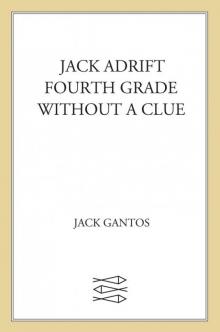 Jack Adrift
Jack Adrift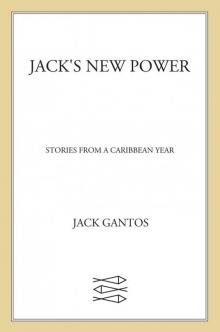 Jack's New Power
Jack's New Power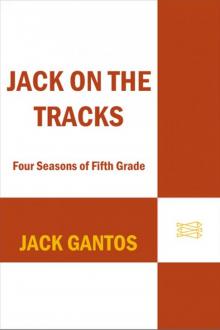 Jack on the Tracks
Jack on the Tracks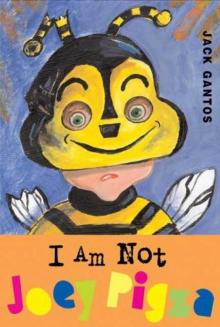 I Am Not Joey Pigza
I Am Not Joey Pigza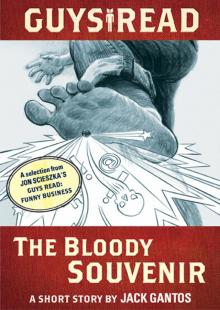 The Bloody Souvenir
The Bloody Souvenir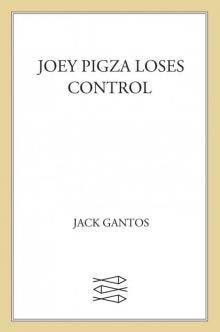 Joey Pigza Loses Control
Joey Pigza Loses Control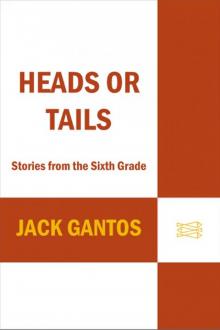 Heads or Tails
Heads or Tails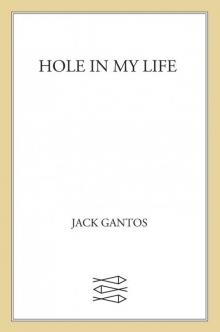 Hole in My Life
Hole in My Life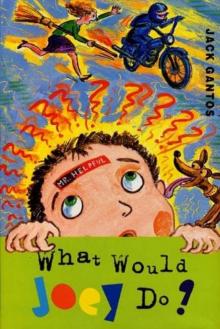 What Would Joey Do?
What Would Joey Do?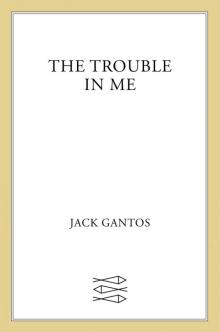 The Trouble in Me
The Trouble in Me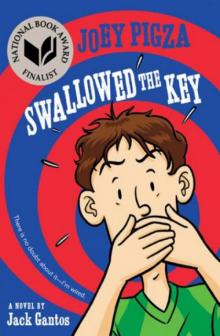 Joey Pigza Swallowed the Key
Joey Pigza Swallowed the Key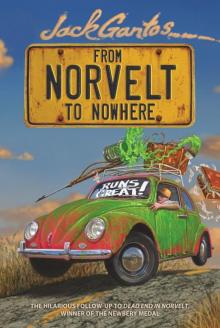 From Norvelt to Nowhere (Norvelt Series)
From Norvelt to Nowhere (Norvelt Series)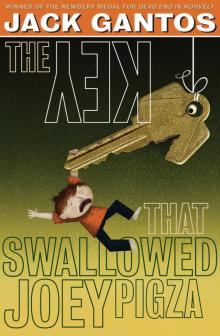 The Key That Swallowed Joey Pigza
The Key That Swallowed Joey Pigza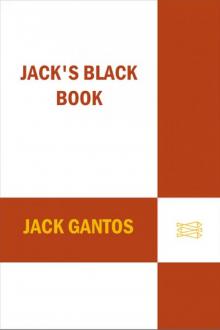 Jack's Black Book
Jack's Black Book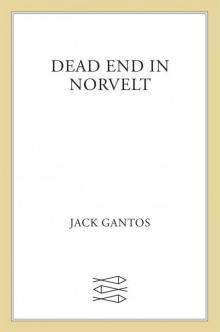 Dead End in Norvelt
Dead End in Norvelt